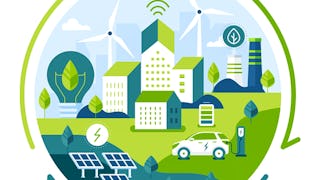As the world’s population continues to rise toward an expected 10 billion citizens by 2050, it is imperative that business practices change to ensure a high quality of life is possible for all of us, both human and non-human. Today’s learners are very aware of this. Moreover, they are highly motivated and have the extraordinary capacity to create a future that provides both economic success and a more enduring, resilient, and sustainable planet. If you are one of these learners, then Sustainability and the Circular Economy is a course for you.


Profitez d'une croissance illimitée avec un an de Coursera Plus pour 199 $ (régulièrement 399 $). Économisez maintenant.

Sustainability and the Circular Economy
Ce cours fait partie de Spécialisation Applied Sustainability for Technical Managers

Instructeur : Michael J. Readey, Ph.D.
6 572 déjà inscrits
Inclus avec
(94 avis)
Expérience recommandée
Ce que vous apprendrez
Understand the reasons for climate change and its ramifications.
Explain how power is generated today, and its associated impact on global warming.
Recognize how sustainability applies to transportation, homes and cities, food and fashion.
Describe the principles of the Circular Economy, and how the Butterfly Diagram can be used in product design.
Compétences que vous acquerrez
- Catégorie : Sustainable Development
- Catégorie : Environmental Engineering
- Catégorie : Climate Change Mitigation
- Catégorie : Organizational Leadership
- Catégorie : Architectural Design
- Catégorie : Sustainable Engineering
- Catégorie : Environmental Policy
- Catégorie : Energy and Utilities
- Catégorie : Corporate Sustainability
- Catégorie : Environmental Science
- Catégorie : Building Design
- Catégorie : Sustainability Standards
- Catégorie : Sustainable Business
- Catégorie : Sustainable Technologies
- Catégorie : Environment
- Catégorie : Strategic Leadership
- Catégorie : Economics
- Catégorie : Business Leadership
Détails à connaître

Ajouter à votre profil LinkedIn
23 devoirs
Découvrez comment les employés des entreprises prestigieuses maîtrisent des compétences recherchées

Élaborez votre expertise du sujet
- Apprenez de nouveaux concepts auprès d'experts du secteur
- Acquérez une compréhension de base d'un sujet ou d'un outil
- Développez des compétences professionnelles avec des projets pratiques
- Obtenez un certificat professionnel partageable

Il y a 6 modules dans ce cours
Welcome to Sustainability and the Circular Economy! This first module introduces the course and how it operates. It then exposes you to the major challenges facing the world today, such as climate change, ocean acidification, biodiversity loss, plastic pollution and social inequity. We capture this with a discussion of planetary boundaries (Rockstrom) and the concept of the Anthropocene. The module ends on a high note with people and organizations that are making real change possible.
Inclus
11 vidéos5 lectures3 devoirs2 sujets de discussion
This module introduces the classic definition of sustainability and sustainable development (Brundtland Commission), along with contemporary concepts of regenerative and restorative practices. We discuss the IPAT equation as a means of providing a macro-view of environmental impacts as a function of population and affluence. The UN Sustainable Development Goals are covered, with a view to how business can impact these in a positive way. The module concludes with an overview of neoliberal economics and the resulting wealth inequality it led to, and a more positive, inclusive model proposed by Kate Raworth in her book, "Doughnut Economics".
Inclus
6 vidéos1 lecture1 devoir1 évaluation par les pairs1 sujet de discussion
This module opens with an overview of the greenhouse effect resulting from greenhouse gases, both good and bad. We then illustrate from the Keeling Curve that GHGs are increasing and have been markedly since the dawn of the industrial revolution. We then discuss the relationship between GHGs and anthropogenic sources, meaning mostly fossil fuels, and the evidence linking the two. We cover the Carbon Dioxide Equivalent, and how one calculates it from GHG emissions and their respective global warming potentials (GWP). The Albedo Effect is then covered as a reinforcing mechanism to climate change. Finally, the module covers the Paris Accord and the need for change.
Inclus
9 vidéos5 devoirs
This module is all about conventional power generation using coal, natural gas and nuclear energy. The module begins with how coal, oil and natural gas are formed millions of years ago. We then discuss basic units of heat, power and energy, using both English and International units to communicate in a bilingual way. We dive deeper into nuclear energy, its pros and cons, and whether it should be part of a zero-carbon future. The module wraps up with a discussion of the UN's initiatives called Conference of Parties, or COP, and the resulting outcome of the Paris Climate Accord to limit global warming to 2.0o Celsius.
Inclus
9 vidéos5 devoirs1 sujet de discussion
Now that you understand the global challenges facing all of us, this module showcases the emerging solutions demonstrating the value of sustainable products and to identify them. We cover the areas of transportation, noting the rapid transition to Electric Vehicles, and and developments in E-Planes. As billions of people across the globe migrate to the cities to live and work, there is considerable opportunity to design/redesign cities to be more livable, and this module highlights several successes across the world, including green building and retrofit techniques. We then explore sustainability in daily life, discussing the emerging area of Regenerative Agriculture, the process of growing more nutritious food with zero synthetic inputs, while benefitting the soil. How that food is distributed is changing as well, as consumers everywhere are paying attention not only to what they eat but who is providing it. The module then discusses the clothes that we wear, as consumers are becoming increasingly aware that what they put on their bodies is as important as what they put in their bodies. Apparel and the fashion industry are one of the greatest polluters of all industries, and consumers are demanding change. We wrap-up this module with a discussion of how Fast Fashion is giving way to a new model of Slow Fashion.
Inclus
12 vidéos3 lectures5 devoirs1 sujet de discussion
In this final module, we transition from greenhouse gases, climate change and power generation to the product lifecycle, introducing the concept of the Circular Economy, and how it differs from today's linear economy. We begin with a brief overview of the linear economy, and how it is challenged to support 8 Billion people on the planet. We then show the three basic principles of the Circular Economy, and how it decouples economic growth from resource extraction. We emphasize the work of the Ellen MacArthur Foundation, going through the Circular Economy Butterfly Diagram in detail, with many examples highlighting how this is put into practice. We conclude with an overview of the recycling process, its successes and current challenges.
Inclus
6 vidéos3 lectures4 devoirs1 évaluation par les pairs1 sujet de discussion
Obtenez un certificat professionnel
Ajoutez ce titre à votre profil LinkedIn, à votre curriculum vitae ou à votre CV. Partagez-le sur les médias sociaux et dans votre évaluation des performances.
Préparer un diplôme
Ce site cours fait partie du (des) programme(s) diplômant(s) suivant(s) proposé(s) par University of Colorado Boulder. Si vous êtes admis et que vous vous inscrivez, les cours que vous avez suivis peuvent compter pour l'apprentissage de votre diplôme et vos progrès peuvent être transférés avec vous.¹
Instructeur

En savoir plus sur Environmental Science and Sustainability

University of Colorado Boulder

University of Colorado Boulder
Pour quelles raisons les étudiants sur Coursera nous choisissent-ils pour leur carrière ?




Avis des étudiants
94 avis
- 5 stars
85,10 %
- 4 stars
8,51 %
- 3 stars
2,12 %
- 2 stars
1,06 %
- 1 star
3,19 %
Affichage de 3 sur 94
Révisé le 12 juin 2025
This is a very complete course for everyone who is interested in learning more about sustainability. Great course !
Révisé le 5 sept. 2024
This was a great course to cover basics on sustainability. It could have been better if the section on Circular Economy was more elaborate to include how to make everyday tasks circular ecologically.
Révisé le 20 août 2024
Very interesting course with complete info and good real examples. Highly recommended.
Foire Aux Questions
To access the course materials, assignments and to earn a Certificate, you will need to purchase the Certificate experience when you enroll in a course. You can try a Free Trial instead, or apply for Financial Aid. The course may offer 'Full Course, No Certificate' instead. This option lets you see all course materials, submit required assessments, and get a final grade. This also means that you will not be able to purchase a Certificate experience.
When you enroll in the course, you get access to all of the courses in the Specialization, and you earn a certificate when you complete the work. Your electronic Certificate will be added to your Accomplishments page - from there, you can print your Certificate or add it to your LinkedIn profile.
Yes. In select learning programs, you can apply for financial aid or a scholarship if you can’t afford the enrollment fee. If fin aid or scholarship is available for your learning program selection, you’ll find a link to apply on the description page.
Plus de questions
Aide financière disponible,







